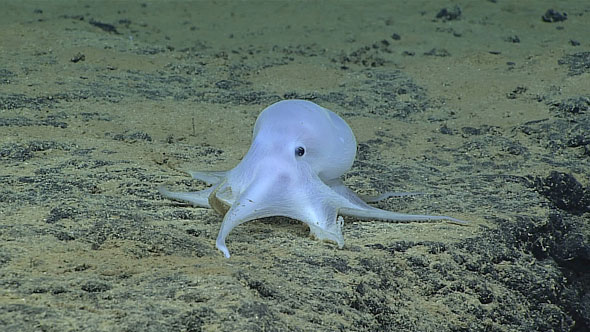-
Tips for becoming a good boxer - November 6, 2020
-
7 expert tips for making your hens night a memorable one - November 6, 2020
-
5 reasons to host your Christmas party on a cruise boat - November 6, 2020
-
What to do when you’re charged with a crime - November 6, 2020
-
Should you get one or multiple dogs? Here’s all you need to know - November 3, 2020
-
A Guide: How to Build Your Very Own Magic Mirror - February 14, 2019
-
Our Top Inspirational Baseball Stars - November 24, 2018
-
Five Tech Tools That Will Help You Turn Your Blog into a Business - November 24, 2018
-
How to Indulge on Vacation without Expanding Your Waist - November 9, 2018
-
5 Strategies for Businesses to Appeal to Today’s Increasingly Mobile-Crazed Customers - November 9, 2018
New ‘ghostlike’ species of octopus discovered
The baby octopus was found about 4,000 meters, or 2.5 miles deep off Necker Island, and was found on February 27 by the remotely operated Deep Discoverer.
Advertisement
“The appearance of this animal was unlike any published records and was the deepest observation ever for this type of cephalopod”, he says.
Octopuses are easily separated into two main suborders: (i) cirrate, or finned, octopuses (suborder Cirrina), characterized by fins on the sides of their bodies and fingerlike cirri associated with the suckers on their arms, and (ii) incirrate octopuses (suborder Incirrina), which lack both fins and cirri.
Scientists from the United States National Oceanic and Atmospheric Administration (NOAA) said that the creature, discovered at a depth of about 4,290m, made it a depth record for an octopod without fins. Cephalopods are deemed the largest, most mobile and intelligent of all mollusks, which comprise octopuses, squids and cuttlefish.
Casper is an incirrate octopod, meaning it does not have fins, and this is the first time an incirrate was seen so deep in the ocean.
Vecchione says that the animal had suckers aligned in one series on each arm, as opposed to the usual two.
The lack of pigment cells, called chromatophores, typical of most cephalopods, as well as the depth where it was found makes it a most unusual specimen.
With much of the deep sea remaining unexplored, it is hardly surprising for scientists to discover previously unknown life.
The octopod was quickly nicknamed Casper due to its resemblance to the cartoon ghost with the large head, see-through appearance, and big round eyes.
“We are now considering combining this observation with some other very deep incirrate observations by a German cruise in the eastern Pacific into a manuscript for publication in the scientific literature”, said Vecchione, who is with NOAA’s National Systematics Laboratory.
Advertisement
Scientists involved the find also believe that the octopod hasn’t been described ever and may not even belong to any described genus.




























